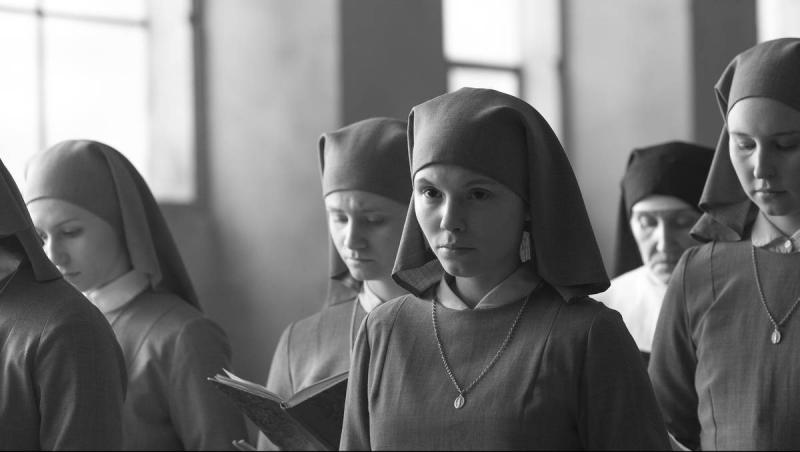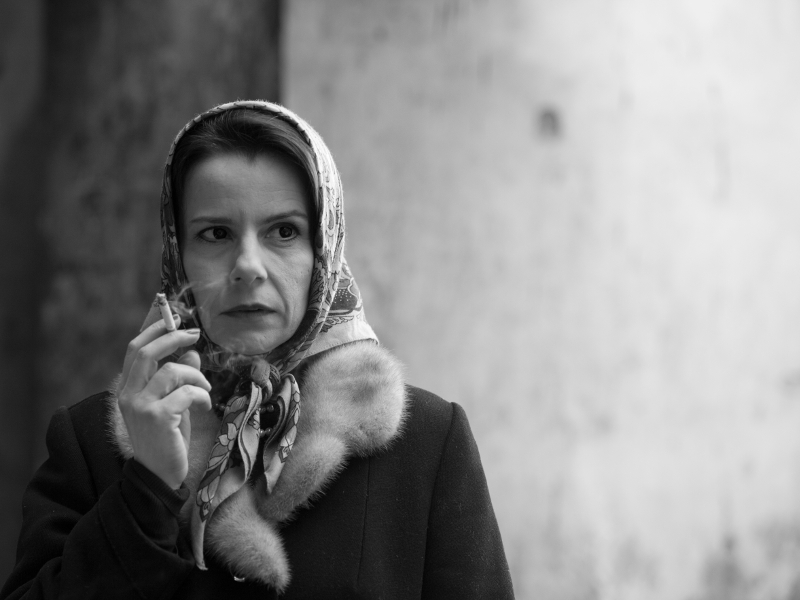Ida | reviews, news & interviews
Ida
Ida
Pawel Pawlikowski delivers on his early promise with an award-winning drama

Sometimes a film has you swooning from the very first frame, and Polish director Pawel Pawlikowski's fifth narrative feature is one such film. The story of a nun's self-discovery is captured in delicate monochrome by cinematographers Ryszard Lenczewski (Margaret) and Lukasz Zal, who render the often austere surroundings with great, gob-stopping imagination in a film whose beauty is enough to make you bow down and praise Jesus, whatever your religious proclivities.
Agata Trzebuchowska (mesmerising in her acting debut) is Anna, a novice nun in early 1960s Poland preparing to take her vows. She's a woman without history, a picture of smooth, unblemished purity, living a stark and simple present - the opener shows her carefully restoring a statue of Christ. Anna's life is thrown into turmoil when she's persuaded to visit her only remaining relative, Wanda (Agata Kulesza, pictured below right), her maternal aunt, who, for reasons unknown, neglected to take her in when she was orphaned, allowing her sister's daughter to languish sans identity in the convent.
 Wanda is a faded, hard-bitten and promiscuous character, coasting on her former glories as a formidable state prosecutor (known as Red Wanda), and forlornly clinging onto her looks. She acts as a rude awakening to Anna's chaste, sheltered existence, refusing to mince her words or conceal her bitterness as she tells her unspoilt niece, "I'm a slut, and you're a little saint."
Wanda is a faded, hard-bitten and promiscuous character, coasting on her former glories as a formidable state prosecutor (known as Red Wanda), and forlornly clinging onto her looks. She acts as a rude awakening to Anna's chaste, sheltered existence, refusing to mince her words or conceal her bitterness as she tells her unspoilt niece, "I'm a slut, and you're a little saint."
In sensational yet calmly received news, Wanda informs Anna that she's really a Jew named Ida, whose parents were murdered during the Nazi occupation of Poland. Her identity finally established, the pair take off on an odd-couple adventure to track down the final resting place of Ida's parents. Wanda, it transpires, is dealing with unfinished business, while the enigmatic Anna/Ida gets a chance to try an ordinary life on for size.
There's something perversely showy about employing it modern-day, but shooting in, or converting to, black and white certainly has its advantages. Reducing the cinematic colour-scheme can increase clarity, or imbue a picture with melancholy, severity or dramatic weight, and it's still being very effectively utilised: The White Ribbon, Tabu, Blancanieves and Nebraska to name four striking but very different recent examples.
Here monochrome suits the stripped-back story, the slightly gloomy introspection and the early 1960s era; it emphasises Ida's virtuousness and the corruption of her aunt, whilst also cloaking the latter in retro glamour. A particularly striking effect is that, shorn of their nuance, Ida's eyes appear black; round, shiny and piercing, flickering between incomparably innocent, inhuman and accusatory.
Pawlikowski's previous films include My Summer of Love and Last Resort. His last feature, The Woman in the Fifth, was a slightly hokey thriller, and this spare, sensitive (though perhaps a little slight) tale of redemption redeems him too. Radiant with compositional brilliance and steeped in sorrow, Ida was the winner of Best Film at the 2013 London Film Festival and, as that suggests, has taken its time to reach us. If you can bear the burden of its heartbreak you'll find that it has certainly been worth waiting for.
Overleaf: watch the trailer for Ida
rating
Explore topics
Share this article
The future of Arts Journalism
You can stop theartsdesk.com closing!
We urgently need financing to survive. Our fundraising drive has thus far raised £49,000 but we need to reach £100,000 or we will be forced to close. Please contribute here: https://gofund.me/c3f6033d
And if you can forward this information to anyone who might assist, we’d be grateful.

Subscribe to theartsdesk.com
Thank you for continuing to read our work on theartsdesk.com. For unlimited access to every article in its entirety, including our archive of more than 15,000 pieces, we're asking for £5 per month or £40 per year. We feel it's a very good deal, and hope you do too.
To take a subscription now simply click here.
And if you're looking for that extra gift for a friend or family member, why not treat them to a theartsdesk.com gift subscription?
more Film
 Bugonia review - Yorgos Lanthimos on aliens, bees and conspiracy theories
Emma Stone and Jesse Plemons excel in a marvellously deranged black comedy
Bugonia review - Yorgos Lanthimos on aliens, bees and conspiracy theories
Emma Stone and Jesse Plemons excel in a marvellously deranged black comedy
 theartsdesk Q&A: director Kelly Reichardt on 'The Mastermind' and reliving the 1970s
The independent filmmaker discusses her intimate heist movie
theartsdesk Q&A: director Kelly Reichardt on 'The Mastermind' and reliving the 1970s
The independent filmmaker discusses her intimate heist movie
 Blu-ray: Wendy and Lucy
Down-and-out in rural Oregon: Kelly Reichardt's third feature packs a huge punch
Blu-ray: Wendy and Lucy
Down-and-out in rural Oregon: Kelly Reichardt's third feature packs a huge punch
 The Mastermind review - another slim but nourishing slice of Americana from Kelly Reichardt
Josh O'Connor is perfect casting as a cocky middle-class American adrift in the 1970s
The Mastermind review - another slim but nourishing slice of Americana from Kelly Reichardt
Josh O'Connor is perfect casting as a cocky middle-class American adrift in the 1970s
 Springsteen: Deliver Me From Nowhere review - the story of the Boss who isn't boss of his own head
A brooding trip on the Bruce Springsteen highway of hard knocks
Springsteen: Deliver Me From Nowhere review - the story of the Boss who isn't boss of his own head
A brooding trip on the Bruce Springsteen highway of hard knocks
 The Perfect Neighbor, Netflix review - Florida found-footage documentary is a harrowing watch
Sundance winner chronicles a death that should have been prevented
The Perfect Neighbor, Netflix review - Florida found-footage documentary is a harrowing watch
Sundance winner chronicles a death that should have been prevented
 Blu-ray: Le Quai des Brumes
Love twinkles in the gloom of Marcel Carné’s fogbound French poetic realist classic
Blu-ray: Le Quai des Brumes
Love twinkles in the gloom of Marcel Carné’s fogbound French poetic realist classic
 Frankenstein review - the Prometheus of the charnel house
Guillermo del Toro is fitfully inspired, but often lost in long-held ambitions
Frankenstein review - the Prometheus of the charnel house
Guillermo del Toro is fitfully inspired, but often lost in long-held ambitions
 London Film Festival 2025 - a Korean masterclass in black comedy and a Camus classic effectively realised
New films from Park Chan-wook, Gianfranco Rosi, François Ozon, Ildikó Enyedi and more
London Film Festival 2025 - a Korean masterclass in black comedy and a Camus classic effectively realised
New films from Park Chan-wook, Gianfranco Rosi, François Ozon, Ildikó Enyedi and more
 After the Hunt review - muddled #MeToo provocation
Julia Roberts excels despite misfiring drama
After the Hunt review - muddled #MeToo provocation
Julia Roberts excels despite misfiring drama
 London Film Festival 2025 - Bradley Cooper channels John Bishop, the Boss goes to Nebraska, and a French pandemic
... not to mention Kristen Stewart's directing debut and a punchy prison drama
London Film Festival 2025 - Bradley Cooper channels John Bishop, the Boss goes to Nebraska, and a French pandemic
... not to mention Kristen Stewart's directing debut and a punchy prison drama
 Ballad of a Small Player review - Colin Farrell's all in as a gambler down on his luck
Conclave director Edward Berger swaps the Vatican for Asia's sin city
Ballad of a Small Player review - Colin Farrell's all in as a gambler down on his luck
Conclave director Edward Berger swaps the Vatican for Asia's sin city

Add comment